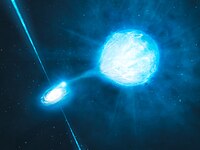
Radiography in high mass X-ray binaries
Sign Up to like & getrecommendations! Published in 2020 at "Astronomy and Astrophysics"
DOI: 10.1051/0004-6361/202038791
Abstract: Context. In high mass X-ray binaries, an accreting compact object orbits a high mass star which loses mass through a dense and read more here.
Keywords: radiography high; mass; mass ray; ray binaries ... See more keywords

Relativistic fluid modelling of gamma-ray binaries
Sign Up to like & getrecommendations! Published in 2021 at "Astronomy and Astrophysics"
DOI: 10.1051/0004-6361/202039278
Abstract: Context. We have presented a numerical model for the non-thermal emission of gamma-ray binaries in a pulsar-wind driven scenario. Aims. We apply this model to one of the best-observed gamma-ray binaries, the LS 5039 system.… read more here.
Keywords: gamma ray; model; pulsar wind; ray binaries ... See more keywords

Case Study on the γ-algorithm: Possible Tests from the Luminosity versus Displacement Correlation of High Mass X-ray Binaries
Sign Up to like & getrecommendations! Published in 2021 at "Research in Astronomy and Astrophysics"
DOI: 10.1088/1674-4527/ac3125
Abstract: Using the apparent correlation of luminosity (LX) versus displacement (R) of high mass X-ray binaries (HMXBs), we aim to constrain the common envelope (CE) mechanism, which is vital in the formation and evolution of compact… read more here.
Keywords: luminosity versus; versus displacement; correlation; mass ray ... See more keywords

Search for periodic neutrino emission from X-ray binaries
Sign Up to like & getrecommendations! Published in 2021 at "Journal of Instrumentation"
DOI: 10.1088/1748-0221/16/09/c09025
Abstract: X-ray binaries (XRBs) are binary systems with an accreting compact object. They have long been suggested to be possible galactic cosmic ray (CR) accelerators. In such models, the protons accelerated by the accretion process at… read more here.
Keywords: search periodic; ray; neutrino emission; ray binaries ... See more keywords

Infrared interferometry to spatially and spectrally resolve jets in X-ray binaries
Sign Up to like & getrecommendations! Published in 2020 at "Monthly Notices of the Royal Astronomical Society"
DOI: 10.1093/mnras/staa1193
Abstract: Infrared interferometry is a new frontier for precision ground based observing, with new instrumentation achieving milliarcsecond (mas) spatial resolutions for faint sources, along with astrometry on the order of 10 microarcseconds. This technique has already… read more here.
Keywords: spectrally resolve; infrared interferometry; resolve jets; spatially spectrally ... See more keywords

Early neutron star evolution in high-mass X-ray binaries
Sign Up to like & getrecommendations! Published in 2020 at "Monthly Notices of the Royal Astronomical Society"
DOI: 10.1093/mnras/staa675
Abstract: The application of standard accretion theory to observations of X-ray binaries provides valuable insights into neutron star properties, such as their spin period and magnetic field. However, most studies concentrate on relatively old systems, where… read more here.
Keywords: neutron star; mass ray; high mass; ray binaries ... See more keywords

A new radio census of neutron star X-ray binaries
Sign Up to like & getrecommendations! Published in 2021 at "Monthly Notices of the Royal Astronomical Society"
DOI: 10.1093/mnras/stab1995
Abstract: We report new radio observations of a sample of 36 neutron star (NS) X-ray binaries, more than doubling the sample in the literature observed at current-day sensitivities. These sources include 13 weakly magnetized (B <… read more here.
Keywords: radio; new radio; neutron star; ray binaries ... See more keywords

Towards a larger sample of radio jets from quiescent black hole X-ray binaries
Sign Up to like & getrecommendations! Published in 2021 at "Monthly Notices of the Royal Astronomical Society"
DOI: 10.1093/mnras/stab644
Abstract: Quiescent black hole X-ray binaries (X-ray luminosities ${\lesssim} 10^{34}\,{\rm erg}\, {\rm s}^{-1}$) are believed to be fed by hot accretion flows that launch compact, relativistic jets. However, due to their low luminosities, quiescent jets have… read more here.
Keywords: hole ray; black hole; quiescent black; ray ... See more keywords

Forming short-period Wolf–Rayet X-ray binaries and double black holes through stable mass transfer
Sign Up to like & getrecommendations! Published in 2017 at "Monthly Notices of the Royal Astronomical Society"
DOI: 10.1093/mnras/stx1430
Abstract: We show that black hole high-mass X-ray binaries (HMXBs) with O- orB-type donor stars and relatively short orbital periods, of order oneweek to several months may survive spiral-in, to then form Wolf-Rayet(WR) X-ray binaries with… read more here.
Keywords: double black; black holes; mass; orbital periods ... See more keywords

Accretion from a clumpy massive-star wind in supergiant X-ray binaries
Sign Up to like & getrecommendations! Published in 2018 at "Monthly Notices of the Royal Astronomical Society"
DOI: 10.1093/mnras/stx3211
Abstract: Supergiant X-ray Binaries (SgXB) host a compact object, often a neutron star (NS), orbiting an evolved O/B star. Mass transfer proceeds through the intense line-driven wind of the stellar donor, a fraction of which is… read more here.
Keywords: wind; accretion; supergiant ray; ray binaries ... See more keywords

Formation time-scales for high-mass X-ray binaries in M33
Sign Up to like & getrecommendations! Published in 2018 at "Monthly Notices of the Royal Astronomical Society"
DOI: 10.1093/mnras/sty1612
Abstract: We have identified 55 candidate high-mass X-ray binaries (HMXBs) in M33 using available archival {\it HST} and {\it Chandra} imaging to find blue stars associated with X-ray positions. We use the {\it HST} photometric data… read more here.
Keywords: mass; formation; mass ray; ray binaries ... See more keywords